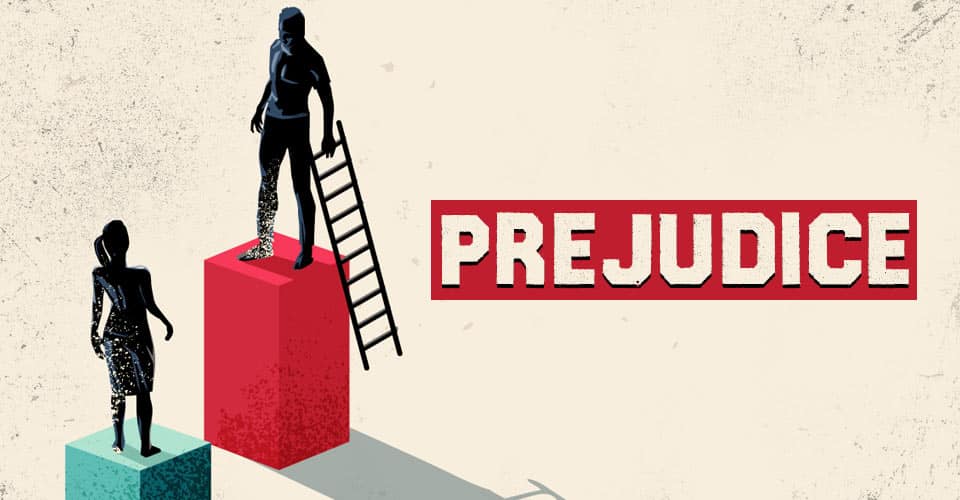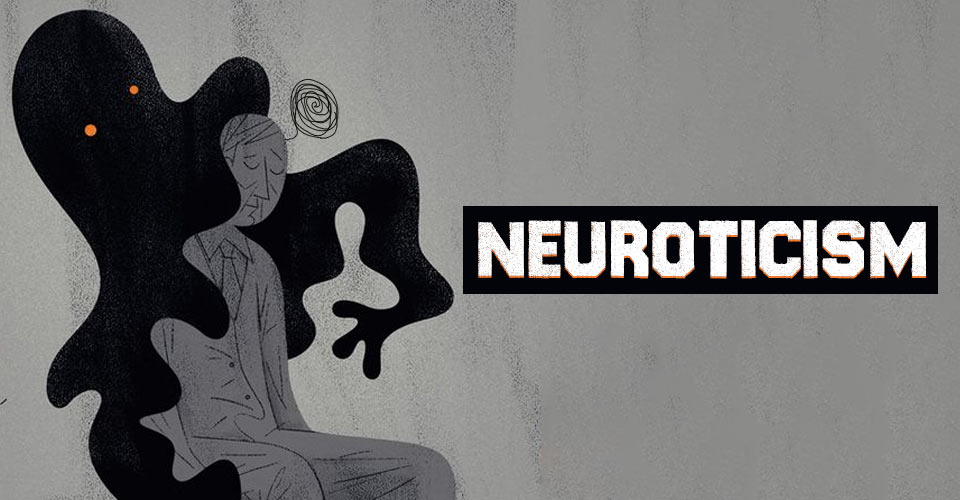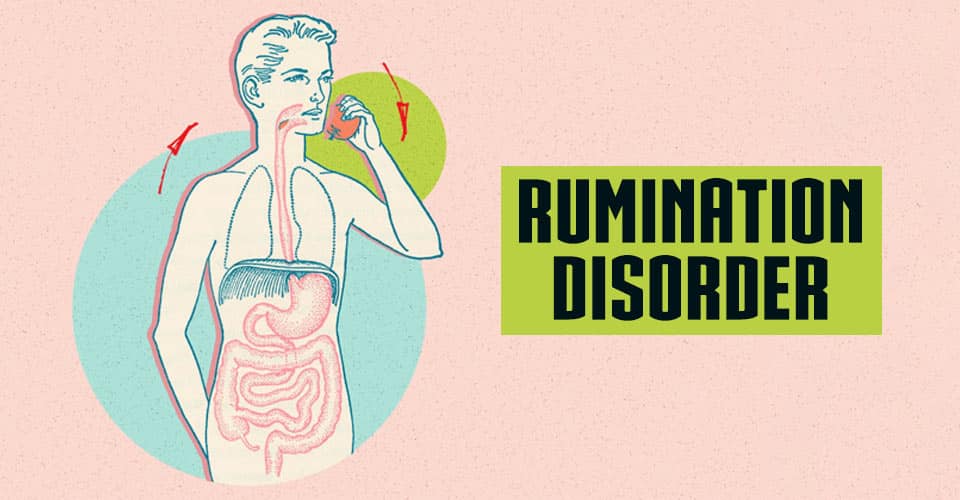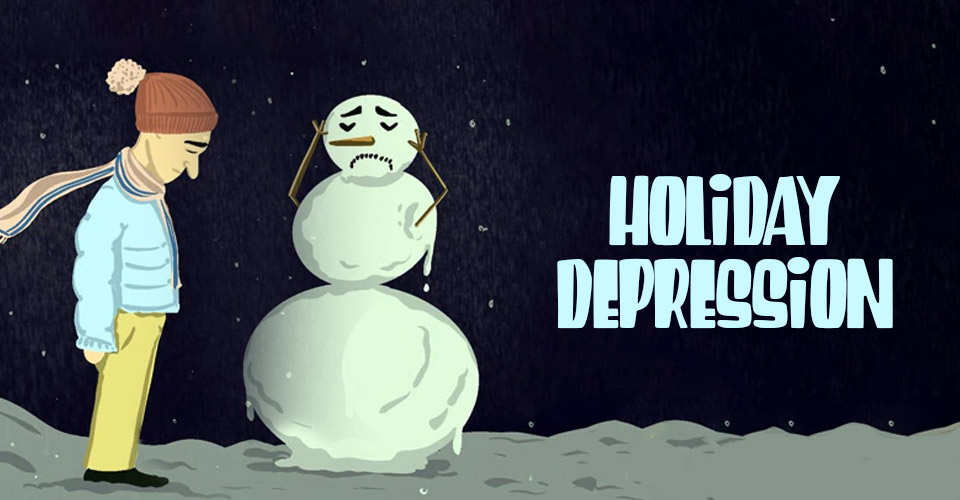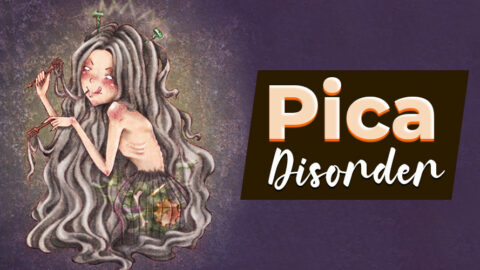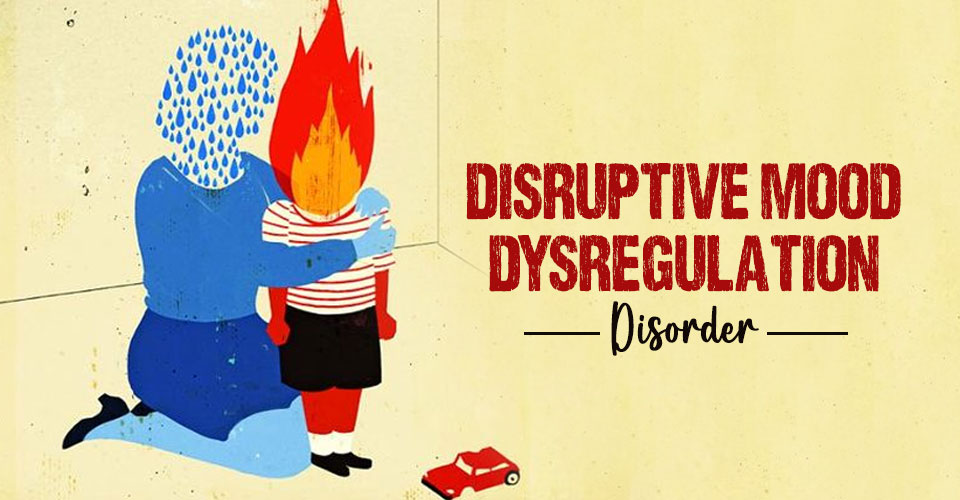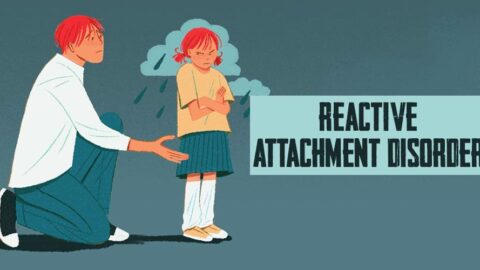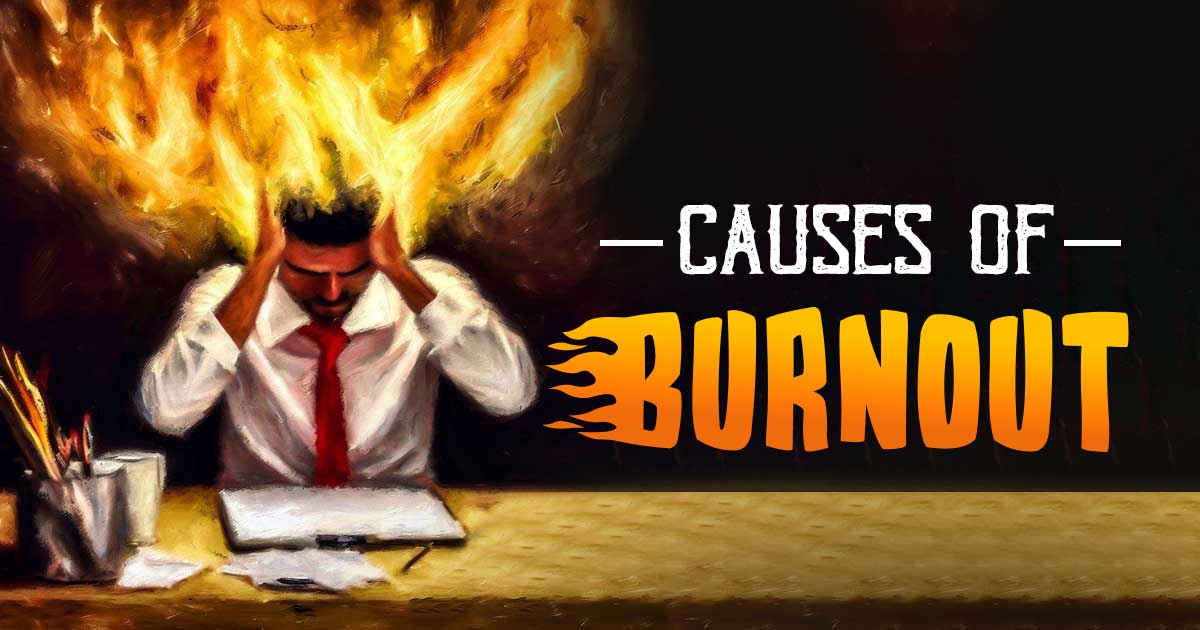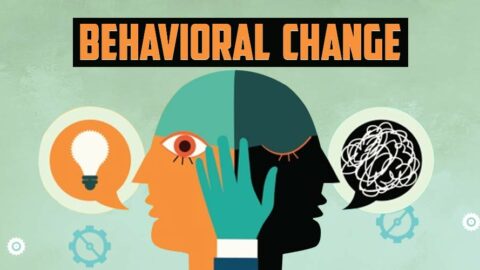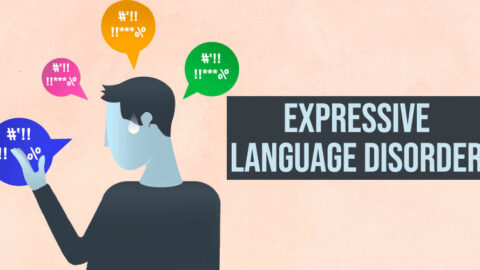Resilience refers to our mental and emotional ability to react to and recover from adversity, difficulty or a crisis and be happy, successful afterwards. It enables us to adapt to change or stress and move ahead.
What Is Resilience?
The resilience of the human psyche is one’s psychological strength 1 De Terte, I., & Stephens, C. (2014). Psychological resilience of workers in high-risk occupations. Stress and Health, 30(5), 353-355. https://doi.org/10.1002/smi.2627 to cope with adverse life experiences, readily recover from it and return to their usual status immediately. It is our ability to accept and overcome major life changes and still function the same way we did before the challenges. Considered as psychological hardiness, it enables us to understand how much adversity we can tolerate before we shift to a different mental state and reach a tipping point.
Resilience is highly prevalent and is observed in 65.1% of individuals as per a study 2 Bonanno, G. A., Galea, S., Bucciarelli, A., & Vlahov, D. (2006). Psychological resilience after disaster: New York City in the aftermath of the September 11th terrorist attack. Psychological science, 17(3), 181–186. https://doi.org/10.1111/j.1467-9280.2006.01682.x . Moreover, it is believed to be “modifiable” which can have therapeutic effects. According to a 2016 study 3 Shrivastava, A., & Desousa, A. (2016). Resilience: A psychobiological construct for psychiatric disorders. Indian journal of psychiatry, 58(1), 38–43. https://doi.org/10.4103/0019-5545.174365 , it is our ability to successfully and swiftly adapt to stressful and traumatic experiences 4 Norris, F. H., Tracy, M., & Galea, S. (2009). Looking for resilience: understanding the longitudinal trajectories of responses to stress. Social science & medicine (1982), 68(12), 2190–2198. https://doi.org/10.1016/j.socscimed.2009.03.043 “while not reverting to the original state.” The study adds that “Resilience is described as an evolving process influenced by a variety of biological, social, and environmental factors.” Moreover, enhancing it can lead to better and new opportunities “for treating and preventing various mental disorders.”
Although it is considered as a desirable trait in most humans, it is not necessarily so as psychopathic states 5 Hicks, B. M., & Patrick, C. J. (2006). Psychopathy and negative emotionality: analyses of suppressor effects reveal distinct relations with emotional distress, fearfulness, and anger-hostility. Journal of abnormal psychology, 115(2), 276–287. https://doi.org/10.1037/0021-843X.115.2.276 also tend to make us resilient. Resilience may lead to psychopathological processes for mental disorders. One 2015 study 6 Sandvik, A. M., Hansen, A. L., Hystad, S. W., Johnsen, B. H., & Bartone, P. T. (2015). Psychopathy, anxiety, and resiliency – Psychological hardiness as a mediator of the psychopathy–anxiety relationship in a prison setting. Personality and Individual Differences, 72, 30-34. https://doi.org/10.1016/j.paid.2014.08.009 found that psychopathic traits can be regarded as resilience against anxiety. The study explains that “several studies have identified associations between psychological hardiness, anxiety responses, and physical and mental health effects of stress.”
However, research 7 Bonanno G. A. (2004). Loss, trauma, and human resilience: have we underestimated the human capacity to thrive after extremely aversive events?. The American psychologist, 59(1), 20–28. https://doi.org/10.1037/0003-066X.59.1.20 reveals that being resilient can not only enable us to overcome potentially traumatic events, but it can also lead to the development of positive psychological traits and emotional experiences with only transient and minor disruptions in our ability to function. Studies 8 Sarchiapone, M., Carli, V., Janiri, L., Marchetti, M., Cesaro, C., & Roy, A. (2009). Family history of suicide and personality. Archives of suicide research : official journal of the International Academy for Suicide Research, 13(2), 178–184. https://doi.org/10.1080/13811110902835148 have also found that being resilient is positively associated with a healthy response to trauma and lower suicidality across all ages, gender and culture. One 2011 study 9 Herrman, H., Stewart, D. E., Diaz-Granados, N., Berger, E. L., Jackson, B., & Yuen, T. (2011). What is resilience?. Canadian journal of psychiatry. Revue canadienne de psychiatrie, 56(5), 258–265. https://doi.org/10.1177/070674371105600504 explains this phenomenon “is understood as referring to positive adaptation, or the ability to maintain or regain mental health, despite experiencing adversity.”
Resilience Is A Defense Mechanism
It has been observed that we have the capability to cope with adverse stimuli and protect ourselves mentally and emotionally that can “challenge” our psychobiological homeostasis. This helps us in developing resilience as a protective tool, a defense mechanism and adaptive characteristics 10Iacoviello, B. M., & Charney, D. S. (2014). Psychosocial facets of resilience: implications for preventing posttrauma psychopathology, treating trauma survivors, and enhancing community resilience. European journal of psychotraumatology, 5, 10.3402/ejpt.v5.23970. https://doi.org/10.3402/ejpt.v5.23970 . This psychological ability helps us avoid or only temporarily experience mental health issues when exposed to acute or chronic physical or psychological stressors.
Hence, it is believed that improving this trait can help us to prevent and treat different psychiatric disorders & maintain psychological well-being 11 Haglund, M. E., Nestadt, P. S., Cooper, N. S., Southwick, S. M., & Charney, D. S. (2007). Psychobiological mechanisms of resilience: relevance to prevention and treatment of stress-related psychopathology. Development and psychopathology, 19(3), 889–920. https://doi.org/10.1017/S0954579407000430 . “This resilient process is characterised by either a trajectory of undisturbed mental health during or after adversities or temporary dysfunctions followed by successful recovery,” states a 2017 study 12 Helmreich, I., Kunzler, A., Chmitorz, A., König, J., Binder, H., Wessa, M., & Lieb, K. (2017). Psychological interventions for resilience enhancement in adults. The Cochrane Database of Systematic Reviews, 2017(2), CD012527. https://doi.org/10.1002/14651858.CD012527 . The researchers also observed that being resilient can also help to improve –
- Active coping
- Acceptance
- Hardiness
- Self‐esteem
- Optimism
- Cognitive flexibility
- Self‐efficacy
- Meaning or purpose in life
- Positive emotions
- Positive reappraisal
- Sense of coherence
- Religiosity, spirituality or religious coping
- Social support
- Attention to one’s physical well-being
- Following a personal moral compass
Understanding Resilience
Although most of us believe that being resilient refers to our capacity to “bounce back 13 Tugade, M. M., & Fredrickson, B. L. (2004). Resilient individuals use positive emotions to bounce back from negative emotional experiences. Journal of personality and social psychology, 86(2), 320–333. https://doi.org/10.1037/0022-3514.86.2.320 ” after facing problems, it is actually our ability to accept, change, adapt, plan and reorganize our thoughts, emotions and life while dealing with a crisis. It is not about rejecting change, rather being open to change and adapting yourself to avoid changing your psyche, behaviors and personality.
It enables us to remain as the same individual by learning from challenges and being able to better deal with issues in future. As it involves an element of learning and growth, we do not necessarily “bounce back” to our former selves. It is not that a resilient individual does not experience any problems, stress, suffering or emotional turmoil. It is more about our willingness to work through pain and suffering instead of simply being mentally tough. In fact, we can truly know if we are resilient only when we have experienced trauma, stress and emotional distress.
Despite what we may expect, life involves considerable struggles, challenges and negative events. Resilience is not about ignoring these distressing events but about being optimistic, staying focused and high-functioning despite the obstacles. Hence, emotional distress is a crucial aspect of psychological hardiness.
We cannot learn how to overcome problems if we never encounter them. However, it is not a personality trait that only a few people possess. We all have this ability which is influenced by certain life experiences. Moreover, one can learn to be more resilient by learning to control their thoughts, emotions, behaviors & actions. However, it may take focus, deliberate effort and patience.
Researchers 14 Cicchetti, D., & Rogosch, F. A. (2012). Gene × Environment interaction and resilience: effects of child maltreatment and serotonin, corticotropin releasing hormone, dopamine, and oxytocin genes. Development and psychopathology, 24(2), 411–427. https://doi.org/10.1017/S0954579412000077 have found that our ability to be resilient is primarily a result of an interaction between our environment and ourselves (genetic endowment 15 Rutten, B. P., Hammels, C., Geschwind, N., Menne-Lothmann, C., Pishva, E., Schruers, K., van den Hove, D., Kenis, G., van Os, J., & Wichers, M. (2013). Resilience in mental health: linking psychological and neurobiological perspectives. Acta psychiatrica Scandinavica, 128(1), 3–20. https://doi.org/10.1111/acps.12095 ). According to a 2013 study, resilience empowers us to better cope with stress and adversity. Chronic adversity, trauma and stressful life experiences can negatively affect our psyche and impact our brain structure and function, believe the researchers.
This can lead to the onset 16 Liu, H., Zhang, C., Ji, Y., & Yang, L. (2018). Biological and Psychological Perspectives of Resilience: Is It Possible to Improve Stress Resistance?. Frontiers in human neuroscience, 12, 326. https://doi.org/10.3389/fnhum.2018.00326 of anxiety, depression, posttraumatic stress disorder (PTSD) & other mental illnesses. Although most of us experience some form of adverse life events, we typically do not develop serious mental disorders, which is mainly due to our ability to be resilient. “Resilience as a successful adaptation relies on effective responses to environmental challenges and ultimate resistance to the deleterious effects of stress,” adds the study.
Read More About Anxiety Here
Drivers Of Resilience
According to a 2014 study 17 Southwick, S. M., Bonanno, G. A., Masten, A. S., Panter-Brick, C., & Yehuda, R. (2014). Resilience definitions, theory, and challenges: interdisciplinary perspectives. European journal of psychotraumatology, 5, 10.3402/ejpt.v5.25338. https://doi.org/10.3402/ejpt.v5.25338 , there are certain determinants of resilience which researchers are now trying to understand from different perspectives and levels of analysis, such as developmental, genetic, epigenetic, cultural, social, demographic and economic. The researchers believe that certain drivers or determinants can help to serve as predictors of resilience but still provide only a glimpse of understanding.
It is believed that childhood protective factors play a crucial role in determining the development of psychological hardiness. Childhood protective factors may involve healthy attachment and relationships, positive caregiving, self-awareness, emotion regulation skills, a mastery motivation system and the ability to to visualize the future. These elements can encourage a person to learn, grow, accept and adapt to their environment.
Drivers of resilience also tend to vary based on certain challenges and the context. For instance, a mother trying to raise a child in a poverty-stricken setting will experience different determinants of mental toughness than a soldier training for war. “While it is useful for researchers to identify general principles related to resilience, it is also important to recognize that successful determinants may vary from one person to the next based on multiple factors such as personality, specific challenges, resources available, and environmental context,” adds the study.
Moreover, it has also been observed that our capacity to be resilient is related to how well we can utilize a range of coping strategies in a positive and adaptive way based on the particular situation and issue at hand. It also involves effective application of corrective feedback to improve such coping strategies successfully. “Further, the determinants of resilience may vary depending on the age and maturity of the individual,” explains the study.
Why Resilience Is Important
Resilience is important for us due to multiple reasons. But perhaps the most important reason is that it gives us strength when we are most vulnerable. It develops the mental toughness and energy to acknowledge, accept and overcome life’s stressors. People who are less resilient tend to become overwhelmed easily and resort to unhealthy coping strategies.
Resilient individuals, on the other hand, can maintain mental and emotional stability during hardship. It enables us to find balance in life when everything seems awry. Moreover, it can also prevent the onset of different mental health conditions 18 Färber, F., & Rosendahl, J. (2018). The Association Between Resilience and Mental Health in the Somatically Ill. Deutsches Arzteblatt international, 115(38), 621–627. https://doi.org/10.3238/arztebl.2018.0621 and recovery from adversity-related mental ill health 19 Rutten, B. P., Hammels, C., Geschwind, N., Menne-Lothmann, C., Pishva, E., Schruers, K., van den Hove, D., Kenis, G., van Os, J., & Wichers, M. (2013). Resilience in mental health: linking psychological and neurobiological perspectives. Acta psychiatrica Scandinavica, 128(1), 3–20. https://doi.org/10.1111/acps.12095 . “Protection factors seem to be more important in the development of resilience than risk factors,” states a 2013 study 20 Shastri P. C. (2013). Resilience: Building immunity in psychiatry. Indian journal of psychiatry, 55(3), 224–234. https://doi.org/10.4103/0019-5545.117134 .
Here are some advantages of being resilient in life –
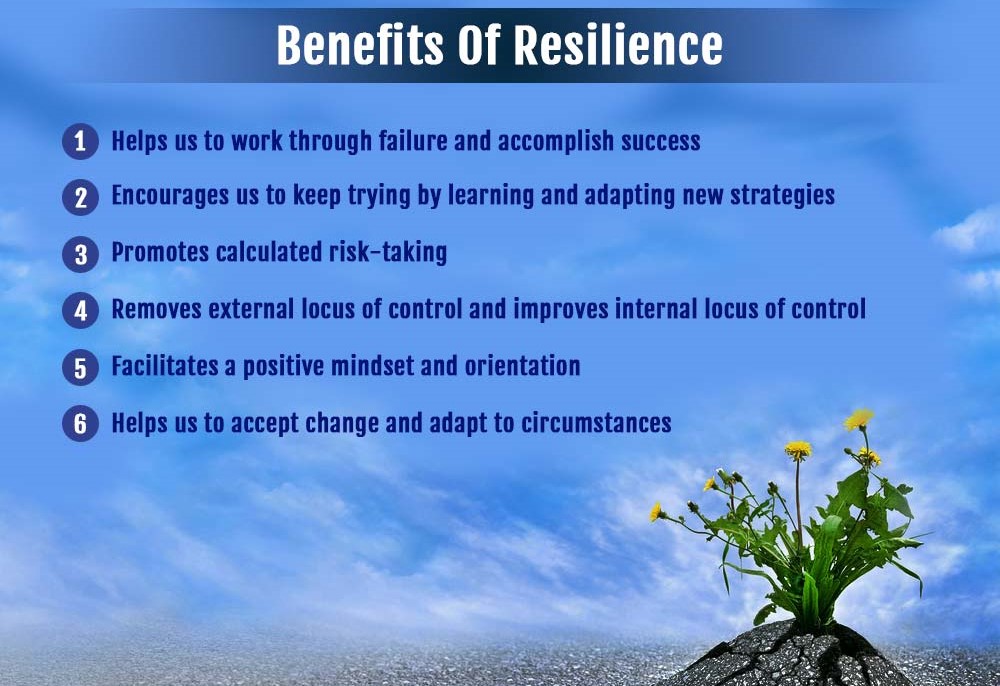
- Helps us to work through failure and accomplish success
- Encourages us to keep trying by learning and adapting new strategies
- Promotes calculated risk-taking
- Removes external locus of control and improves internal locus of control
- Facilitates a positive mindset and orientation
- Helps us to accept change and adapt to circumstances
- Motivates us to step out of our comfort zone
- Enhances our sense of personal responsibility and accountability
- Promotes learning & growth
- Supports academic accomplishments and career development
- Stronger stress resistance & better stress management
- Better regulation of negative emotions & experiencing more positive emotions
- Enhanced problem-solving & decision making
- Improved management of depression, PTSD or other conditions
- Reduces unhealthy behaviors like unnecessary risk-taking behaviors, substance or alcohol use etc
- Encourages higher involvement in family and community
- Improves mental & physical health
In fact, studies 21 Shatté, A., Perlman, A., Smith, B., & Lynch, W. D. (2017). The Positive Effect of Resilience on Stress and Business Outcomes in Difficult Work Environments. Journal of occupational and environmental medicine, 59(2), 135–140. https://doi.org/10.1097/JOM.0000000000000914 have found that being resilient is associated with achieving success in one’s career. “Workers with high resilience have better outcomes in difficult work environments” that involve low support and high demand, adds the study. The researchers found that resilience has a more protective effect for stress, depression, job strain, sleep deprivation, burnout, productivity and absence.
Models Of Resilience
According to a 2008 study 22 Fleming, J., & Ledogar, R. J. (2008). Resilience, an Evolving Concept: A Review of Literature Relevant to Aboriginal Research. Pimatisiwin, 6(2), 7–23. , there are 3 different models of resilience, namely compensatory, protective & challenge. The models help to define how resilience functions to change the course from risk exposure to negative outcome. Here are the 3 models of being resilient –
1. Compensatory model
This model “best explains a situation where a resilience factor counteracts or operates in an opposite direction to a risk factor,” states the study. The resilience factor leaves a direct and strong impact on the outcome, which is considered unrestrained by the effect of the risk factor.
2. Protective model
The study explains “In the protective model, assets or resources moderate or reduce the effects of a risk on a negative outcome.” These factors tend to work in different ways that influence the outcomes. These protective factors may weaken or neutralize the impact of risks or improve the “positive effect of another promotive factor in producing an outcome.”
3. Challenge model
In this third model, the relation between the risk factor & the outcome is considered “curvilinear”. This means that exposure to risk factors, whether high or low level, are connected with adverse outcomes while moderate levels of risk are associated with positive or less negative outcomes. “Adolescents exposed to moderate levels of risk, for example, may be confronted with enough of the risk factor to learn how to overcome it but are not exposed to so much of it that overcoming it is impossible,” the study adds.
Types Of Resilience
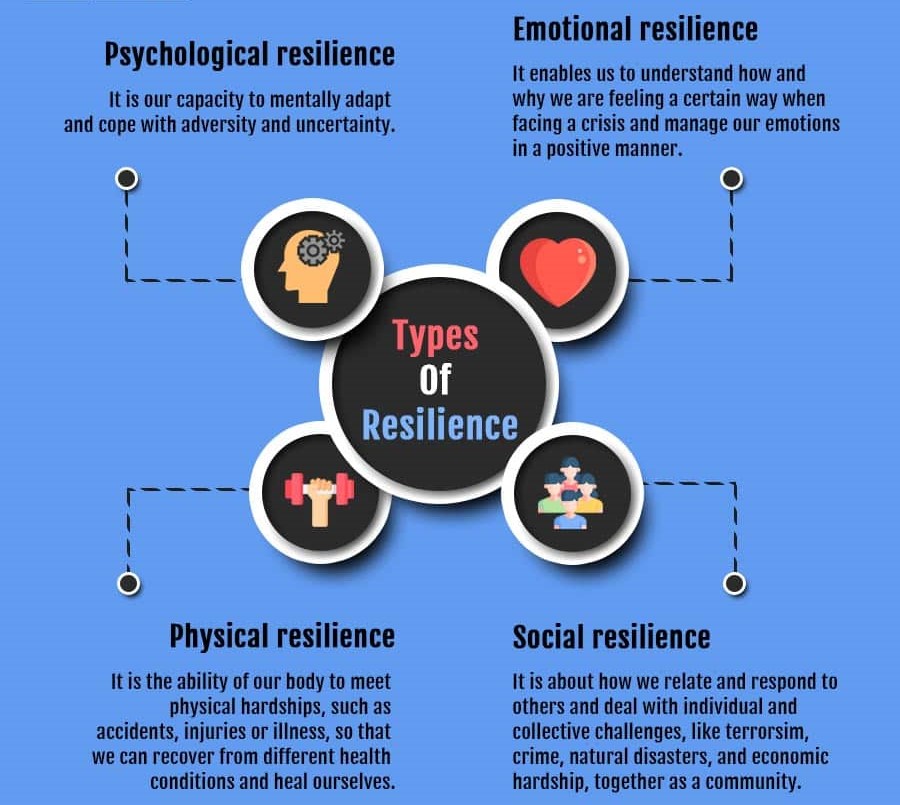
While going through the trials and tribulations of life, we may need to exhibit different types of mental toughness to bounce back from challenges and failures. Resilience is commonly categorized into these 4 types –
1. Physical resilience
It is the ability of our body to meet physical hardships, such as accidents, injuries or illness, so that we can recover from different health conditions and heal ourselves. It is about how our body adapts to difficult and challenging environments, sustains energy, strength and stamina, accomplishes a physically demanding task and recovers effectively. Research 23 Whitson, H. E., Duan-Porter, W., Schmader, K. E., Morey, M. C., Cohen, H. J., & Colón-Emeric, C. S. (2016). Physical Resilience in Older Adults: Systematic Review and Development of an Emerging Construct. The journals of gerontology. Series A, Biological sciences and medical sciences, 71(4), 489–495. https://doi.org/10.1093/gerona/glv202 reveals that physical resilience helps in healthy aging and recovering from medical problems. Following a healthy diet and lifestyle, getting enough sleep and relaxation techniques can help to improve it.
2. Psychological resilience
It refers to our capacity to mentally adapt and cope with adversity and uncertainty. Also known as mental fortitude or mental toughness, it enables us to withstand challenging circumstances while focusing on problem solving. Mental fortitude not only enables us to find strength and remain calm when facing adversity, it also controls the fear of facing uncertainty. Moreover, it helps us to work with change by being creative, agile and flexible in our thoughts, beliefs and ideas. Mental toughness “is associated with various positive psychological traits, more efficient coping strategies and positive outcomes in education and mental health,” explains a 2017 study 24 Lin, Y., Mutz, J., Clough, P. J., & Papageorgiou, K. A. (2017). Mental Toughness and Individual Differences in Learning, Educational and Work Performance, Psychological Well-being, and Personality: A Systematic Review. Frontiers in psychology, 8, 1345. https://doi.org/10.3389/fpsyg.2017.01345 .
3. Emotional resilience
How well we control our emotional reactions and responses to stress & adversity and manage our negative emotions, such as sadness, anger, fear or jealousy, determines how emotionally resilient we are. Emotional strength empowers us to tolerate and move through challenges to prevent the negative impact of life stressors. It is associated with our optimism, emotional awareness, emotional intelligence, acceptance and perseverance.
It enables us to understand how and why we are feeling a certain way when facing a crisis and manage our emotions in a positive manner. According to a 2009 study 25 Davis M. C. (2009). Building Emotional Resilience to Promote Health. American journal of lifestyle medicine, 3(1 Suppl.), 60S–63S. https://doi.org/10.1177/1559827609335152 , building emotional resilience helps to improve health. “The bulk of evidence has suggested that individuals who sustain high levels of positive emotion accrue substantial health benefits,” adds the study.
4. Social resilience
It is our ability to socially connect with others in our community. It is about how we relate and respond to others and deal with individual and collective challenges, like terrorsim, crime, natural disasters, and economic hardship, together as a community. It involves certain core elements, such as respect, acceptance, tolerance, diversity and trust.
Being socially resilient also involves our ability to make & maintain friendships, network, be social, work as a team, support our family and help in improving the community. A 2017 study 26 Patel, S. S., Rogers, M. B., Amlôt, R., & Rubin, G. J. (2017). What Do We Mean by ‘Community Resilience’? A Systematic Literature Review of How It Is Defined in the Literature. PLoS currents, 9, ecurrents.dis.db775aff25efc5ac4f0660ad9c9f7db2. https://doi.org/10.1371/currents.dis.db775aff25efc5ac4f0660ad9c9f7db2 states “The concept of ‘community resilience’ is almost invariably viewed as positive, being associated with increasing local capacity, social support and resources, and decreasing risks, miscommunication and trauma.”
The 7 C’s Of Resilience
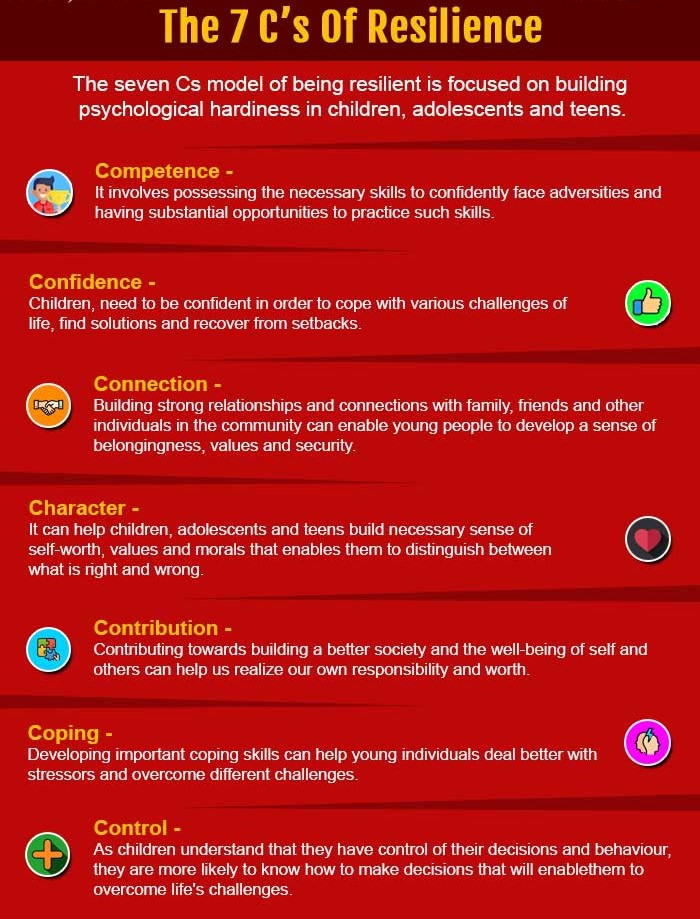
The seven Cs model of being resilient is focused on building psychological hardiness in children, adolescents and teens. These seven interrelated and integral components, namely competence, confidence, connection, character, contribution, coping and control, form the crux of resilience. These are considered as crucial skills for children and adolescents to cope with adversity effectively. A 2019 study 27 Mahmoud, N. N., & Rothenberger, D. (2019). From Burnout to Well-Being: A Focus on Resilience. Clinics in colon and rectal surgery, 32(6), 415–423. https://doi.org/10.1055/s-0039-1692710 explains that the 7 C’s were developed by Dr. Kenneth Ginsburg and Dr. Anthony Rostain, clinicians at the University of Pennsylvania. “Effective interventions promoting resilience should ideally positively impact one or more of these factors,” adds the study. The 7 C’s are detailed below –
1. Competence
Competence refers to our ability of knowing that we can effectively deal with and possibly overcome stressful situations. It involves possessing the necessary skills to confidently face adversities and having substantial opportunities to practice such skills.
2. Confidence
Confidence refers to an individual’s belief in their own abilities and strengths, which is driven by competence. We, especially children, need to be confident in order to cope with various challenges of life, find solutions and recover from setbacks. Confidence can be developed by utilizing our competence in real life stressful situations.
3. Connection
Building strong relationships and connections with family, friends and other individuals in the community can enable young people to develop a sense of belongingness, values and security. This can help them to utilize creative problem solving and stand their ground.
4. Character
Character can help children, adolescents and teens build necessary sense of self-worth, values and morals that enables them to distinguish between what is right and wrong. It can also make them more caring, committed, sincere and have integrity.
5. Contribution
Contributing towards building a better society and the well-being of self and others can help us realize our own responsibility and worth. Identifying the value of personal contribution can help to experience motivation, purpose and happiness.
6. Coping
Developing important coping skills can help young individuals deal better with stressors and overcome different challenges. Healthy coping strategies can enable children and teens to avoid unhealthy and dangerous alternative solutions, like using drugs and alcohol, for dealing with stress.
7. Control
According to research 28 Ginsberg, K. (n.d.). The Seven “Cs” of Resilience. Canberra Girls Grammar School. https://www.cggs.act.edu.au/storage/The%20Seven%20Cs%20of%20Resilience.pdf based on Dr. Kenneth Ginsberg, M.D.’s work, “Children who realize that they can control the outcomes of their decisions are more likely to realize that they have the ability to bounce back.” Understanding that they have control over and accountability for their choices can help to build competence and confidence in children and develop a stronger sense of personal responsibility.
What Builds Resilience
Several factors have been identified by experts that can influence resilience in a person, such as optimism, positive attitude, emotion regulation, ability to accept failure and feedback etc. Studies 29 Thompson, K. A., Bulls, H. W., Sibille, K. T., Bartley, E. J., Glover, T. L., Terry, E. L., Vaughn, I. A., Cardoso, J. S., Sotolongo, A., Staud, R., Hughes, L. B., Edberg, J. C., Redden, D. T., Bradley, L. A., Goodin, B. R., & Fillingim, R. B. (2018). Optimism and Psychological Resilience are Beneficially Associated With Measures of Clinical and Experimental Pain in Adults With or at Risk for Knee Osteoarthritis. The Clinical journal of pain, 34(12), 1164–1172. https://doi.org/10.1097/AJP.0000000000000642 have found that optimism is closely associated with psychological resilience and endogenous pain inhibition. Apart from this, genetic predisposition may also play a significant role in the development of resilience.
However, life experiences and early environments may also impact resilient genes. A recent 2020 study 30 Maul, S., Giegling, I., Fabbri, C., Corponi, F., Serretti, A., & Rujescu, D. (2020). Genetics of resilience: Implications from genome-wide association studies and candidate genes of the stress response system in posttraumatic stress disorder and depression. American journal of medical genetics. Part B, Neuropsychiatric genetics : the official publication of the International Society of Psychiatric Genetics, 183(2), 77–94. https://doi.org/10.1002/ajmg.b.32763 revealed that “Resilience is undeniably influenced by genetic factors, but very little is known about the exact underlying mechanisms.” Another 2019 study 31 Niitsu, K., Rice, M. J., Houfek, J. F., Stoltenberg, S. F., Kupzyk, K. A., & Barron, C. R. (2019). A Systematic Review of Genetic Influence on Psychological Resilience. Biological research for nursing, 21(1), 61–71. https://doi.org/10.1177/1099800418800396 found that psychological hardiness is a complex biopsychosocial phenomenon which is influenced by a person’s genetic variants, epigenetics, epistasis and gene-environment interactions 32 Gillespie, C. F., Phifer, J., Bradley, B., & Ressler, K. J. (2009). Risk and resilience: genetic and environmental influences on development of the stress response. Depression and anxiety, 26(11), 984–992. https://doi.org/10.1002/da.20605 . Studies 33 Navrady, L. B., Zeng, Y., Clarke, T. K., Adams, M. J., Howard, D. M., Deary, I. J., & McIntosh, A. M. (2018). Genetic and environmental contributions to psychological resilience and coping. Wellcome open research, 3, 12. https://doi.org/10.12688/wellcomeopenres.13854.1 indicate that “genetic and environmental factors contribute to both psychological resilience and coping style.”
Research 34 Feder, A., Nestler, E. J., & Charney, D. S. (2009). Psychobiology and molecular genetics of resilience. Nature reviews. Neuroscience, 10(6), 446–457. https://doi.org/10.1038/nrn2649 also found that resilience is regulated by adaptive changes in different neural circuits including neurotransmitter & molecular pathways. Such changes affect the operation of neural circuits which control emotion reactivity, reward, fear and social behavior. These factors are believed to regulate effective stress management. “Understanding the interplay between genetic and biological processes and different environments is necessary in order to elucidate the causal pathways through which individuals show resilience or vulnerability in the face of adversity,” states a 2013 report 35 Bowes, L., & Jaffee, S. R. (2013). Biology, genes, and resilience: toward a multidisciplinary approach. Trauma, violence & abuse, 14(3), 195–208. https://doi.org/10.1177/1524838013487807 .
Life experiences also play a vital role in psychological hardiness. Someone who has experienced trauma or chronic adversity is likely to become highly resilient. However, this tends to vary from person to person, as some individuals resort to unhealthy coping mechanisms, like alcohol and substance use, which can negatively affect their mindset.
How To Improve Resilience
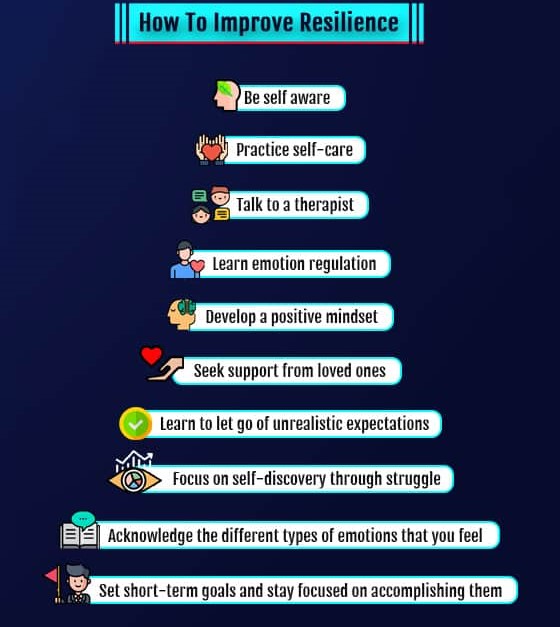
Regardless of how resilient you may be, you can always develop and cultivate resilience over time by using certain self-help strategies, such as –
1. Be self-aware
Developing emotional awareness can help you identify how you react & respond to stressors or challenges and learn better & more effective adaptive coping strategies. Being self-aware will also help to improve your competence and confidence.
2. Learn emotion regulation
Learning to control your thoughts, emotions and behaviors in the face of challenges and hardships is a crucial step in developing psychological hardiness. You can improve your emotion regulation abilities by practicing relaxation strategies, such as deep breathing, progressive muscle relaxation, mindfulness 36 Guendelman, S., Medeiros, S., & Rampes, H. (2017). Mindfulness and Emotion Regulation: Insights from Neurobiological, Psychological, and Clinical Studies. Frontiers in psychology, 8, 220. https://doi.org/10.3389/fpsyg.2017.00220 , meditation, guided imagery, biofeedback 37 Can, Y. S., Iles-Smith, H., Chalabianloo, N., Ekiz, D., Fernández-Álvarez, J., Repetto, C., Riva, G., & Ersoy, C. (2020). How to Relax in Stressful Situations: A Smart Stress Reduction System. Healthcare (Basel, Switzerland), 8(2), 100. https://doi.org/10.3390/healthcare8020100 etc. Getting adequate sleep, following a healthy diet and regular exercise can also help to manage stress better. “Physical activity and healthy eating seem to be protective against experiencing stress and negative affect as well as increase positive affect,” explains a 2019 study 38 Schultchen, D., Reichenberger, J., Mittl, T., Weh, T., Smyth, J. M., Blechert, J., & Pollatos, O. (2019). Bidirectional relationship of stress and affect with physical activity and healthy eating. British journal of health psychology, 24(2), 315–333. https://doi.org/10.1111/bjhp.12355 .
Read More About Emotion Regulation Here
3. Talk to a therapist
Studies 39 Joyce, S., Shand, F., Tighe, J., Laurent, S. J., Bryant, R. A., & Harvey, S. B. (2018). Road to resilience: a systematic review and meta-analysis of resilience training programmes and interventions. BMJ open, 8(6), e017858. https://doi.org/10.1136/bmjopen-2017-017858 have found that cognitive behavioral therapy (CBT) and mindfulness-based interventions can have a positive effect of resilience. Apart from these, other therapy approaches 40 Macedo, T., Wilheim, L., Gonçalves, R., Coutinho, E. S., Vilete, L., Figueira, I., & Ventura, P. (2014). Building resilience for future adversity: a systematic review of interventions in non-clinical samples of adults. BMC psychiatry, 14, 227. https://doi.org/10.1186/s12888-014-0227-6 , such as interpersonal therapy, acceptance and commitment therapy, attention and interpretation therapy, transformational coping, and positive psychology techniques, can also help someone in being more resilient in life. Hence, talking to a therapist 41 Helmreich, I., Kunzler, A., Chmitorz, A., König, J., Binder, H., Wessa, M., & Lieb, K. (2017). Psychological interventions for resilience enhancement in adults. The Cochrane Database of Systematic Reviews, 2017(2), CD012527. https://doi.org/10.1002/14651858.CD012527 can help you to deal with stress better and boost your mental strength.
4. Seek support from loved ones
Talk openly and honestly with trusted loved ones about your thoughts and feelings regarding any negative experiences you may be facing. Having a strong support system can not only help to build new connections and strengthen existing relationships, it can also help you be more resilient. Although sharing your problems with family and friends will not solve your problems, having some moral support can make you feel mentally and emotionally stronger.
According to a 2007 study 42 Ozbay, F., Johnson, D. C., Dimoulas, E., Morgan, C. A., Charney, D., & Southwick, S. (2007). Social support and resilience to stress: from neurobiology to clinical practice. Psychiatry (Edgmont Pa. : Township), 4(5), 35–40. , social support is associated with resilience to stress. The study adds “Numerous studies indicate social support is essential for maintaining physical and psychological health.” Research 43 Southwick, S. M., Sippel, L., Krystal, J., Charney, D., Mayes, L., & Pietrzak, R. (2016). Why are some individuals more resilient than others: the role of social support. World psychiatry : official journal of the World Psychiatric Association (WPA), 15(1), 77–79. https://doi.org/10.1002/wps.20282 also shows psychological resilience is typically fostered by healthy caregiving conditions during childhood and having loving, reliable, consistent & emotionally responsive parents.
5. Develop a positive mindset
Being more optimistic in your daily life will help you develop an internal locus of control making you feel more responsible and in charge of your own life. To be more positive and optimistic, learn to identify your strengths and weaknesses, focus on what you have control over in a challenging situation and think more about solutions rather than problems.
6. Practice self-care
Focus on meeting your own needs and acknowledging your emotions, whether negative or positive, instead of avoiding them. Take care of your health, practice good personal hygiene, have a healthy lifestyle, restrict your consumption of alcohol, caffeine & nicotine, spend time in nature, engage in creative activities, socialize, and learn new stress management skills.
Here are some other helpful tips for developing resilience –
- Focus on self-discovery through struggle
- Learn how to accept change and develop a flexible mindset
- Acknowledge the different types of emotions that you feel
- Avoid procrastination and be more proactive in dealing with problems
- Set short-term goals and stay focused on accomplishing them
- Write down your thoughts and feelings on a daily basis and maintain a journal
- Challenge yourself constantly by facing your fears in a progressive manner
- Make relationships a priority and connect with people who understand you
- Join a local or online group to connect with people who have overcome trauma or join faith-based communities
- Be deliberate about avoiding unhealthy coping skills like drugs, alcohol and other substances
- Volunteer in homeless shelters or help others in whatever you can to find a sense of purpose in life
- Practice mindfulness and meditation daily
- Be kind with yourself, don’t be overly hard on yourself and learn to forgive yourself and others
- Learn to let go of unrealistic expectations
Takeaway
Resilience is our natural ability to navigate through the ups and downs of life. Everyone is resilient with varying degrees depending on their life experiences, mindset, genetics and personality. However, gaining a better understanding of ourselves and identifying our strengths and weaknesses can enable us to be more resilient and mentally strong.
Resilience At A Glance
- Resilience is our psychological strength to cope with adverse life experiences, recover from it and return to our normal status.
- Resilience is positively associated with a healthy response to trauma, better mental well-being and lower suicidality across all ages.
- Resilience is a protective tool and a defense mechanism that helps in developing adaptive characteristics.
- Resilience is not about avoiding problems, but about willingness to work through pain and suffering.
- Childhood protective factors, like positive caregiving and healthy attachment play a crucial role in determining the development of resilience.
- Resilience is categorized into these 4 types, namely physical resilience, psychological resilience, emotional resilience and social resilience.
- The 7 C’s of Resilience include interrelated elements, namely competence, confidence, connection, character, contribution, coping and control.
- Resilience is influenced by genetic predisposition, gene-environment interactions, optimism, positive attitude, emotion regulation, ability to accept failure and feedback.


